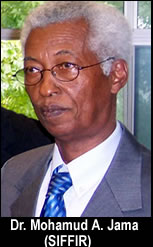
PRESS RELEASE
Tuesday, November 28, 2006
 On Wednesday, November 29, the UN Security Council considers a draft resolution, which, if adopted, will lift the arms embargo against Somalia first imposed in 1992 and eliminate the legal prohibition to the deployment of East African troops in support of the Transitional Federal Government of Somalia. The deliberations of the Council come a month after the suspension of the Khartoum-based dialogue over the objections of the UIC to the deployment of Ethiopian troops in Somalia and to Kenya’s campaign and support to the lifting of the arms embargo and deployment of IGAD troops.
On Wednesday, November 29, the UN Security Council considers a draft resolution, which, if adopted, will lift the arms embargo against Somalia first imposed in 1992 and eliminate the legal prohibition to the deployment of East African troops in support of the Transitional Federal Government of Somalia. The deliberations of the Council come a month after the suspension of the Khartoum-based dialogue over the objections of the UIC to the deployment of Ethiopian troops in Somalia and to Kenya’s campaign and support to the lifting of the arms embargo and deployment of IGAD troops.
The Council also considers a report by a United Nations Monitoring Group that reports arms violations by 12 states, who respectively support the TFG and the UIC and more ominously the deployment of troops and military advisors and trainers from Ethiopia and Uganda and Eritrea in support of the TFG and UIC. An exemption to the arms embargo and authorization of the deployment of IGAD troops as part of regional counter-terrorist strategy will effectively incorporate Somalia’s neighbors into Somalia’s factional and clan warfare. This will also transform and expand Somalia’s factional conflicts into a regional strife between Islamists and counter-terrorist warriors, which will make a solution to the Somali tragedy both difficult and costly to all concerned.
The Security Council should heed the findings and recommendations of its expert group. The Council should not mandate Somalia’s neighbors or other States in the region, who either approach Somalia as part of a wider regional conflict or seek authorization of an IGAD mission in order to create an opportunity to rent their armies- militias.
The Council should choose one of two options: It should leave Somalia to its vices and those of its neighbors as it has done since 1995, when a two year old UN mission was terminated. Alternatively, the UN Security Council should maintain and tighten the arms embargo and authorize a UN mission to monitor and deter violations of the arms embargo. The mission should be mandated to strengthen and support the Khartoum-based dialogue and assist the Somali parties to negotiate and implement a national security and stabilization plan. Such an approach will attract the moderates in both the TFG and UIC and the vast majority of the Somalis and help defuse the escalating regional conflict as well.
An appeal and a call for dialogue and peace among our people
The challenge to the Transitional Federal Government and the Union of Islamic Courts in Somalia is to agree on a road map for peace that will lead to the restoration of the Somali State. As the Minister of National Reconciliation, I invite all Somalis to reflect on our nation’s tragedy. We must do all we can to prevent outbreak of conflict especially in the midst of the current floods and suffering of our people. I invite both the government and the UIC and others
- To commit themselves to complete cessation of hostilities
- To establish a joint mechanism,
- To formulate a strategy for interim security arrangements.
The Khartoum–based dialogue and negotiations should be expanded to include Somaliland and Puntland as well as other unaffiliated groups. Such an inclusive and expanded approach to the dialogue is likely to strengthen the credibility of the dialogue process, facilitate agreement on a comprehensive political transition and inspire confidence and support for the implementation of negotiated accords that could help overcome obstacle to the restoration of the Somali State.
Finally, the acceptance of these minimal steps will create the opportunities for a more effective and elaborate UN support to the Somali peace process and the implementation of its outcome.
The leaders of both the Government and the Union of Islamic Courts have a choice to make. It is a choice between PEACE AND WAR. It is not a difficult choice to make or understand.
Dr. Mohamud A. Jama
Minister for National Reconciliation and member of the Somali Transitional Federal Parliament
Contact
[email protected]